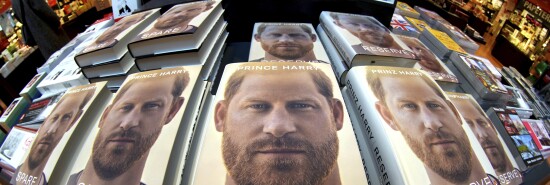
Prince Harry: The woke, spoiled, dumb icon of our age
Dan Hannan
A prolonged whinge by a spiteful and self-pitying blockhead is on course to become the highest-grossing book of all time. Prince Harry’s solipsistic memoir Spare — I can’t help feeling that Spare Us would have summarized the public mood better — sold 1.4 million copies on the day of its publication.
It annoys me when badly written books —The Da Vinci Code, say, or Fifty Shades of Grey — do well. This is not because I begrudge the authors of their success (far from it) but because it undermines my belief in the wisdom of crowds and the appeal of mass democracy.
Here, though, is something far worse: a book whose style, thanks to a skilled ghostwriter, is impressive but whose content is utterly cringe-inducing.
Harry is not alone in being a conceited dolt. Nor is he unique in having bought into the victimhood worship that is fashionable — although it is one of the odder claims to oppressed status to have had a slightly smaller room than your brother in what was, at the end of the day, a palace. But Harry takes his whining to unconsciously hilarious levels with his entitlement, his pettiness, his burning rage about the half-imagined slights suffered in childhood. Had he stepped away from the monarchy in a spirit of republican virtue, he might have won some respect. But his grievance is that the institution that cosseted him put someone else’s claim before his own. His problem is not with the monarchy but with his not being Numero Uno.
One of the most infuriating things about l’affaire Harry is its ubiquity. Unusually for a Brit, I have little interest in royal matters, and there are a thousand things I’d rather watch on Netflix than a pair of spoiled nitwits moaning about their hard lives. But I can’t avoid the wretched subject. It dominates the airwaves and the internet. It has pursued me to British Columbia, where I am writing these words.
Has Harry, as is widely alleged, undermined the monarchy? Not in the way that is commonly meant. Although he is disobliging about his immediate family members, they emerge well from his book, in spite of him. King Charles III comes across as a decent old stick, Prince William as boring but kindly. I should stress that the British like their royals dull, dutiful, and slightly philistine. When George V, Harry’s great-great-grandfather, was shown an exhibition of French impressionist art, he boomed at his queen, “Come and look at this, May, this’ll make you laugh!” So portraying Charles, William, and Kate as unexciting will do them no harm.
But there is a more subtle way in which Harry’s antics might damage the monarchy. He reminds us of the danger of a genetic lottery. After all, what if he had somehow been the next in line? (One suddenly understands why the late queen was so insistent that William and his family should never fly together.) As Tom Paine, the intellectual godfather of the American republic, put it: “Kings succeed each other, not as rationals, but as animals. It signifies not what their mental or moral characters are.”
Maybe. But if someone with the mental or moral character of Henry Charles Albert David, Duke of Sussex, Earl of Dumbarton, and Baron Kilkeel, were in danger of acceding to the throne, Parliament would almost certainly intervene to change the line of succession. It has done so several times before — first in 1689, when it deposed the calamitous James II in favor of his daughter and her Dutch husband, and most recently in 2013, when it altered the rules so that elder sisters should inherit before younger brothers.
My American friends are sometimes surprised by the extent to which the United Kingdom is a crowned republic, in which the sovereign serves at the pleasure of Parliament. This is partly a reflection of how their country was born. There was a fashionable conspiracy theory on both sides of the Atlantic during the 1770s to the effect that the Hanoverians planned to sideline Parliament and rule as medieval despots. It is also partly a reaction to the pomp and ceremony that surrounds monarchy: the parades and state coaches and so forth.
In reality, the crown is decorative rather than functional. Indeed, as I write these words, a Conservative MP and former soldier called Bob Seely is moving a bill to strip Harry of his titles and thereby force him to accept the logic of the choices he has made.
Should Seely’s bill pass, Harry and his wife, Meghan, would have a whole new set of grievances to wallow in, claiming that they were victims of racism or sexism or something or other. They are the icons of our degraded age.
